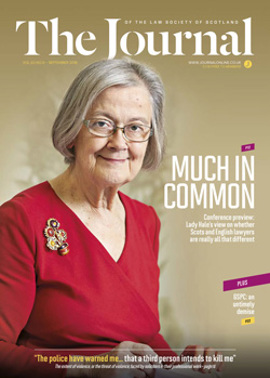Opinion: Kerry Trewern and Rhona McNair

The legal profession, rightly, has high expectations of its trainees. As ex-practitioners and now educators on the Diploma at the University of Glasgow, we liaise regularly with firms and the Law Society of Scotland regarding what is (and should be) the appropriate standard for the “day-one-ready” trainee. Current themes emerging from these conversations include the need for trainees to be “commercially aware”, “resilient”, “adaptable” and – a fairly new theme – “technologically aware”.
High standards indeed. It is probably worth most of us stepping back and remembering just how “commercially aware” we were on our first day as a trainee! Of course, the market evolves and, therefore, so does the need for new skills and knowledge.
With this in mind, we have to ensure that we are teaching our students the full range of skills and knowledge required. Diploma students have a very short time to gain experience in conveyancing, private client and court procedure, among (many) other areas. However, we also equip our students to be more than just good lawyers. They have to be good business people and, importantly, must understand where the legal profession is headed.
This brings us back to the idea of students being “technologically aware”. We acknowledge that technology is playing an important role in shaping the future of the legal profession. It is, however, imperative that universities take an active role in preparing students accordingly.
This is a feeling echoed across the profession: the Law Society of Scotland, for example, recently held a round table discussion on technology. Law firms such as Pinsent Masons are hosting conferences on innovation in the law, aimed specifically at students and junior lawyers.
However, important context to this discussion is the extent to which students appreciate how rapidly technology moves and can change how things are done. Many of us remember doing business before the advent of the internet and mobile phones, but not all of our students can – and not all have therefore seen the impact of technology in action. It is surprising how our tech-savvy students can sometimes be quite naïve in this regard – and how we assume that they know more than we do!
To what extent, though, can we properly teach our students about legal technology when our focus also needs to be on teaching them how to analyse and apply the law in more “traditional” areas correctly? Should we teach them how to code and work with algorithms?
These are difficult questions. We want to offer students the opportunity to explore issues surrounding technology and its impact on the legal profession, but cannot currently expect them to gain in-depth knowledge in the short time they are with us on the Diploma. We are producing “day-one-ready” legal trainees, not IT specialists.
Our solution is the introduction of a new elective course on the Glasgow Diploma, entitled “Legal Innovation and Technology” (LIT). We have recruited experienced, enthusiastic tutors, led by senior tutor Phil Allenby, who have created an innovative course covering a variety of topics, including how artificial intelligence and legal informatics are changing the legal landscape, leading to specialisms in cybersecurity and the data economy. They will also introduce students to coding, albeit with no expectation that they will become programming experts.
What will be interesting, though, is takeup. In polling previous students, while all agreed the course sounded interesting, many suggested that they would choose other, more traditional, courses first – which goes back to our point about student awareness of technology-driven advances. Popular elective courses on the Glasgow Diploma include Commercial Contracts, Family Law and Corporate Law. Students can select a limited number of electives, so whether LIT can compete with these traditional courses remains to be seen.
The upshot is really this: we can all agree that technology is having an impact on the legal profession and that it is incumbent on universities to prepare students accordingly. When it comes down to it, though, will students take the opportunity to learn? It is early days but, as with technology, we have to be prepared for change, when it happens, to be fast – and hopefully LIT is a step in the right direction.
So lastly, we ask: if you were a Diploma student, would you sign up for LIT?!
In this issue
- Confidence restored: internal investigations and legal privilege
- Court reforms: still an unknown quantity
- Ruled out of court?
- Uncovering the environment (1)
- Medical death: a case to answer
- Reading for pleasure
- Opinion: Kerry Trewern and Rhona McNair
- Book reviews
- Profile: Ryan McCuaig
- President's column
- Developing digital services
- People on the move
- Leading judgment
- Health check
- Open to attack
- Claims: beating the trigger
- Storage: time for digital
- GSPC: eulogy for a friend
- Relevant persons: a challenge
- New specialist land registration practice launches
- Good enough reason?
- Copyright: underpinning control
- Writing means writing
- Rent moves: two crucial hoops
- Debtor wins in policy decision
- Scottish Solicitors' Discipline Tribunal
- KIR: the time bomb explodes
- The guideline goal
- GC NextGen: a network for you?
- Your Law Society of Scotland Council members
- Public policy highlights
- Double boost for Society's AML team
- Ask Ash
- Practice rights and the impact of Brexit: working in the EU
- Acting as notary: what do I need to know?
- Engagement letters: a practical approach
- Uncovering the environment
- Paralegal pointers






